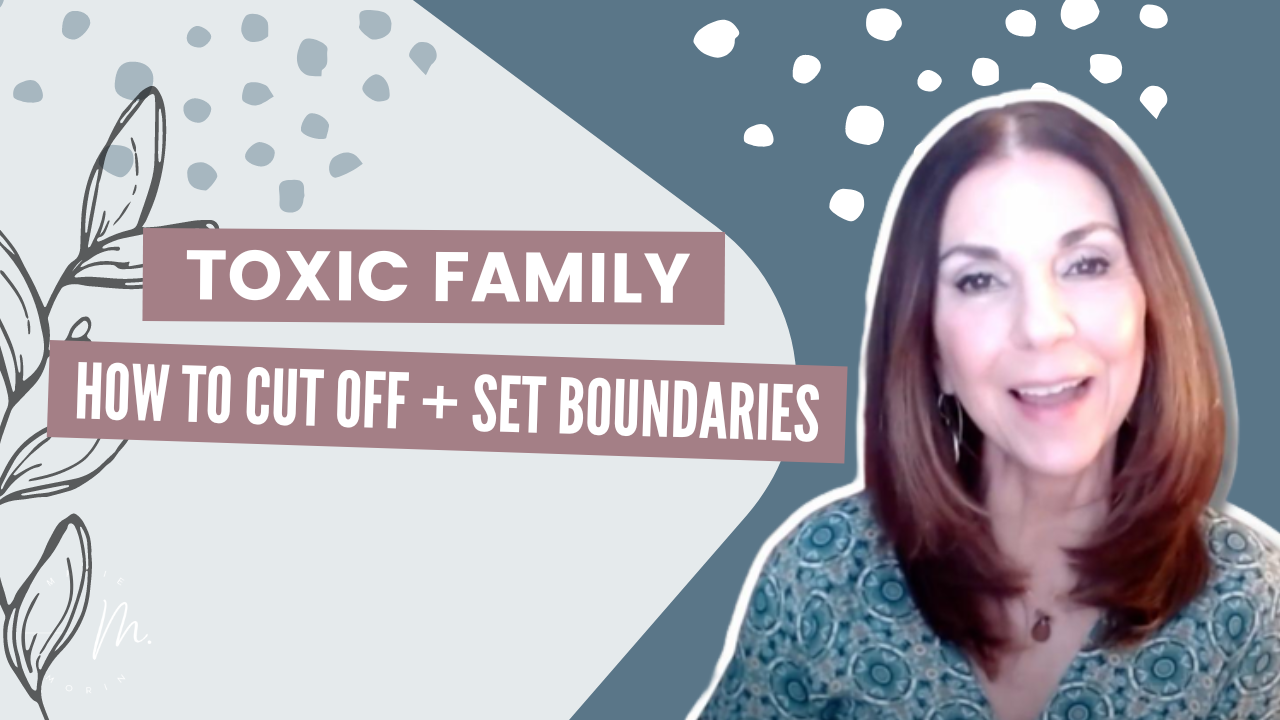Cut off from toxic family? Here’s how to set boundaaries with toxic family members and a stick to it strategy! If you are cut off or estranged from a family member, you know how difficult it is to deal with unfiltered remarks. Whether you were cut off or decided to separate, conflict is inevitable. People that are upset with each other tend to react instead of responding. This article discusses Cut Off Toxic Family and How to Set Boundaries and Stick To Them.
Boundaries and Estrangement
Boundaries are knowing you are responsible for your actions alone. Boundaries provide a fence around you, not a wall. Having boundaries means deciding what is within the limit and what stays out. Boundaries can be changed when circumstances allow for a different approach. Healthy boundaries allow us to determine what we do and with who we will spend our time. Physical, emotional, time and material are a few boundaries. Boundaries protect us so we can align with our choices. When estranged individuals have habitually spoken to each other badly, boundaries are necessary.
Know What You Will And Will Not Accept
Setting a boundary, in theory, isn’t difficult. Telling someone you will no longer accept behaviors is the hard part. Anxiety and courage go hand in hand when you tell someone you mean business is stressful. Usually, we are aware of many behaviors that are at times unbearable.
The relationship could have been so conflicted that it’s an overwhelming task to simplify just one behavior to identify. For that reason, pick a term encapsulating the problem and start there.
Be prepared with a boundary if you see your estranged person at a family function.
If they are usually emotionally charged and do not refrain, your boundary will include what you will and will not accept. You might consider the boundary including behavior words calmly, respectfully, and patiently.
I know avoiding them, arguing, or yelling back is much easier. Your personal growth will occur when you face this violation of what you have accepted in the past. In other words, when we declare a boundary in a calm, respectful tone, we are modeling but also staking our fence. We can choose to continue in our old ways, but why would we when we can stake out precisely what is acceptable.
Setting and declaring our boundary to someone toxic can be liberating. Manipulating, controlling, judgmental, unsupportive, and self-centered behaviors are taxing. The anxiety of being around a toxic family can be crushing when it’s been the norm in a relationship. Stating a boundary delivers a clear message that you mean business.
Boundaries Are Clearly Stated, Easy To Remember, and They Can Adhere
Once you have defined what you will or will not accept, determine how to say it in the simplest way that can be remembered and followed. You might say, “I am unwilling to speak to you unless you can talk calmly; if you yell at me, I am leaving.
Boundaries with your disrespectful family member are essential. Healthy boundaries are clearly stated, can be adhered to, and are easy to remember. Boundaries are your way of creating a fence around what is permitted and what is not.
Unfortunately, stating a boundary does not guarantee that your family member will fall into line and stop. Communicating what you will not accept might aggravate their behavior. Expressing your fence limit is where the courage to say and follow through calmly is essential. Your calm response is as crucial as stating the boundary. The relationship patterns take a turn when you do the changing. When you calmly say your limit, the power of the volley of reaction breaks. In time, the pressures of their behaviors on you lessen. The long-term benefit is less stress regardless of how they react.
Being Consistent And Sticking To Your Boundary
Sticking to your boundary is easiest when you remain calm. Guilt-tripping and manipulating can affect individuals’ attempts to keep their boundaries. When you practice calming techniques, such as diaphragmatic breathing, you learn how to bring your stress level down. If you remain levelheaded, you will be less likely to react and fall into a guilt trip.
Being determined and sticking to your boundary is up to you. You stick to your part. If your family member behaves disrespectfully, you will not answer their calls, then don’t. Your consistency may be challenging. You are free to alter boundaries in time. If your boundary is no phone calls, you can change them later. Suppose, after some time, you become aware that your family member has changed, and you may want to try speaking to them again. Each relationship is different; you will know what works best for you.
Practice Boundary Setting
If you haven’t set boundaries often, you may be anxious about what will happen before, during, and afterward. It is a good idea to role-play with a close friend or therapist. The benefit of role-playing is that it lessens the anxiety and helps you state your boundary clearly.
Practicing will prime your courage, so you are well prepared. You can’t predict the exact reactions, but you can be ready by knowing what you will say.
Practice Calm
Diaphragmatic breathing involves the guidance of the diaphragm and the abdominal muscles. Using your abdominals during practice will help them to strengthen.
This process lowers blood pressure and lowers heart rate. Belly breathing strengthens your diaphragm muscle resulting in the lungs working more efficiently. Also, breathing at this rhythmically slower pace reduces your body’s demand for oxygen. Diaphragmatic breathing is an excellent tool to improve stress levels by eliciting a relaxed state.
Be calm and state what you are willing and unwilling to do without criticizing, attacking, guilt-tripping, and returning fire with fire. Learn how to get yourself relaxed by practicing diaphragmatic breathing. This technique, when practiced regularly, will provide a baseline of calm. You are most able to be nonreactive when you are centered.
Setting a boundary requires a calm, intentional demeanor. Naturally, practicing and following through will take a lot of energy. You have been in stressful, difficult circumstances before you can use that same strength with your family member. Be sure to learn communication skills but also to do daily self-care. Estrangement can cause chronic stress and impact one’s psychological and physical health. Practicing self-care will fill your reservoir so you can respond instead of react.
When your family member is out of control, your most significant support has critical communication skills. Your ability to stay calm and plan for when they speak disrespectfully will help you manage how the conversation progresses. It can be unsettling unless you have learned to develop and maintain boundaries. This article discusses Cut Off Toxic Family and How to Set Boundaries and Stick To Them.






